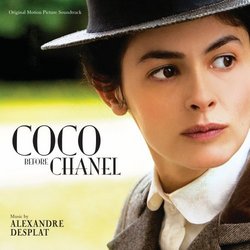More Desplat goodness
Jon Broxton | Thousand Oaks, CA | 08/02/2009
(4 out of 5 stars)
"In the world of French high fashion and haute couture, no name commanded, and continues to command, as much respect and admiration as that of Gabrielle "Coco" Chanel. The film Coco Avant Chanel, directed by Anne Fontaine and starring Audrey Tautou, Benoît Poelvoorde and Alessandro Nivola, charts the formative years of Chanel before she became a household name, from her early life in the poorhouses and orphanages of rural France, to her first faltering efforts at establishing a clothing business in Brittany, and her love affairs with playboys Étienne Balsan and Boy Capel, until her eventual success in pre-war Paris, out of which would grow into one of the premier fashion houses in the world.
The score for Coco Avant Chanel is by the enormously talented and almost ludicrously busy Alexandre Desplat; this is the second of five major scores the Frenchman has on his plate in 2009, following Chéri, and with The Fantastic Mr. Fox, Julie & Julia, and the Twilight sequel New Moon yet to come. Truth be told, Coco Avant Chanel is probably one of the least impressive works in his recent output, but when I say that it doesn't mean it's not good, because it is! It's just that when, in the past two years, you have produced stellar score after stellar score, titles such as Lust Caution, The Golden Compass, and The Curious Case of Benjamin Button, it's inevitable that not everything is going to live up to those enormously high standards.
Like all of Desplat's works, Coco Avant Chanel is light, elegant, beautifully orchestrated, superbly performed by the London Symphony Orchestra, and almost effortlessly charming. Whenever I review a new Desplat score I almost feel like I am constantly re-writing the same review; time after time, the grace and dexterity of his touch, the transparency of his orchestrations, and the natural beauty of the themes shines through in all his scores - I honestly don't know how Desplat continues to write music as wonderful as this without it sounding clichéd, or coming across as a parody of himself, but somehow he manages it, again and again.
The opening cue, "L'Abandon", features the score's main theme, a prototypical Desplat piece, full of graceful movement, lightly prancing strings, a diaphanous melody passed between piano and cor anglais, and the familiar twinkly orchestrations that give all his works a touch of romance and whimsy. The rhythmic element from the opening cue is present in several cues thereafter, notably the lush and vivacious "Royallieu", the slightly bolder "Avenue du Bois", and the tragedy-laden, almost dream-like "Le Chagrin de Coco", where is it accompanied by a forlorn string wash that, while superficially attractive, wraps the theme in an emotionally despondent aspect.
The score's secondary theme appears for the first time in the second cue, "Chez Chanel", and builds from an unexpectedly dark opening into a stunning, opulent waltz that conjures up images of ball gowns swirling in unison, jewels glittering in candle light, under a starlit Parisian sky. It's all wonderfully evocative, full of all those magnificent Desplatisms, from the fluttering flutes darting merrily under the main orchestra, to the harp glissandi and the ringing xylophones and triangles that keep the mood light. Its recapitulation in the score's climactic cue, "Casino de Deauville", ends things on a magical, optimistic note.
A lovely, tender theme for cello and piano is introduced in "Coco & Boy", underscoring the relationship between Chanel and her true love, the dashing English playboy Boy Capel. Other, one off cues of note include the pizzicato-filled "Couture", which portrays sense of urgent movement; the deeply romantic "Premier Baiser", with its luscious cello element; and the unexpected guitar parts in "L'Hippodrome", which add a contemporary edge to Desplat's classicism. However, some of the later cues, notably "Confession de Balsan" and "Coco Rêve de Paris", tend to edge towards the downbeat side of things, and in these cues Desplat's restraint and delicacy comes across as intentionally withdrawn, almost cold.
The reason I say Coco Avant Chanel is probably one of Desplat's least impressive recent works is to do with the lack of a "wow" factor. Other than the glorious waltz in the second cue, there is nothing about Coco Avant Chanel that leaps from the speakers, or makes your jaw drop at his talent and audacity; instead, there is a consistency of tone throughout the score, which allows Desplat's singular orchestral techniques and way of composing to come through, as it always does. It's a safe score, written well within Desplat's boundaries and comfort zone. Don't get me wrong - I really, really liked Coco Avant Chanel, and anyone who commonly enjoys Desplat's scores will undoubtedly really, really like it too. There are moments of stunning beauty and musical clarity here, especially in the waltz theme, that are up with the best that modern film scoring can produce. However, for anyone who has never warmed up to the Frenchman' style, Coco Avant Chanel will not be the score that tips the scale in the opposite direction."
Lovely album
Jon Broxton | 11/28/2009
(5 out of 5 stars)
"After seeing the movie Coco, before Chanel, I wanted to have the music on cd. I loved the movie, loved the cinematography and the musical score.
The cd is great, obviously brings images of the movie to mind, but stands very well on it's own too. I love it."


 Track Listings (18) - Disc #1
Track Listings (18) - Disc #1